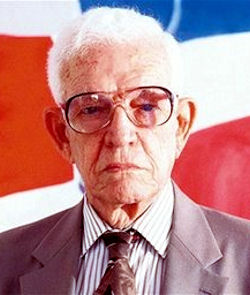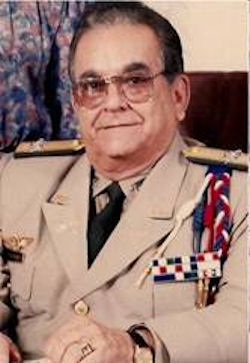Dominican Republic - Democratic Struggles
 As were the years following the assassination of Heureaux decades earlier, the immediate post-Trujillo period was a convulsive one for the country. The preexisting political institutions and practices from the Trujillo regime were clearly inimical to a successful democratic transition. Yet, a clear break with the Trujillos was achieved. In January 1962, Joaquin Balaguer, who as vice president had taken over upon Trujillo's death, was forced into exile by opposition elements. A provisional government was formed to prepare for democratic elections.
As were the years following the assassination of Heureaux decades earlier, the immediate post-Trujillo period was a convulsive one for the country. The preexisting political institutions and practices from the Trujillo regime were clearly inimical to a successful democratic transition. Yet, a clear break with the Trujillos was achieved. In January 1962, Joaquin Balaguer, who as vice president had taken over upon Trujillo's death, was forced into exile by opposition elements. A provisional government was formed to prepare for democratic elections.
The upper-class opposition to Trujillo was organized in the National Civic Union (Union Civica Nacional — UCN). The UCN dominated the provisional government and expected its candidate, Viriato Fiallo, to win the elections. To the UCN's surprise, it was defeated by Juan Bosch Gavino, one of the founders of the Dominican Revolutionary Party (Partido Revolucionario Dominicano — PRD) in exile in the late 1930s, and the UCN soon disappeared. The PRD was successfully converted into a mass party with both urban and rural appeal: Bosch campaigned as the candidate of the poor and promised to implement a variety of socioeconomic and political reforms.
The Bosch administration represented a freely elected, liberal, democratic government concerned for the welfare of all Dominicans. The 1963 constitution separated church and state, guaranteed civil and individual rights, and endorsed civilian control of the military. These and other changes, such as land reform, struck conservative landholders and military officers as radical and threatening. The hierarchy of the Roman Catholic Church also resented the secular nature of the new constitution, in particular its provision for legalized divorce. The hierarchy, along with the military leadership and the economic elite, also feared communist influence in the republic, and they warned of the potential for "another Cuba."
As a result, the conservative socio-economic forces coalesced with political, military, and church figures to overthrow President Bosch on September 25, 1963, only seven months after he assumed office; United States support for his government had also weakened. The institutional changes that Bosch, his new constitution, and his proposed reforms represented, in a situation in which his party possessed an absolute majority, were perceived as too threatening; however, middle-sector and popular- sector groups remained relatively weak and unorganized.
If Bosch's regime was overthrown in 1963 ostensibly because of its alleged communist nature, weak radical leftist elements were in fact strengthened by the coup, and the country experienced further polarization over the next several years.
Following the coup, a civilian junta known as the Triumvirate, dominated by the UCN and headed by Emilio de los Santos, was formed. However, Santos resigned on December 23 and was replaced by Donald Reid Cabral, who increasingly became the dominant figure. His regime lacked legitimacy or strong support, however, and on April 25, 1965, a civil-military conspiracy sought to return Bosch to power. The Dominican government's action provoked a series of events leading to the "constitutionalist" uprising in support of Bosch.
 Three days later, on April 28, the United States intervened because the "loyalist" Dominican military troops led by General Elias Wessin y Wessin were unable to control the growing civil-military rebellion, often referred to as a civil war. The intervention was the result of an exaggerated fear on the part of the United States regarding a potential "second Cuba." Its unilateral nature was subsequently modified by the creation of an OASsponsored peace force, which supplemented the United States military presence in the republic.
Three days later, on April 28, the United States intervened because the "loyalist" Dominican military troops led by General Elias Wessin y Wessin were unable to control the growing civil-military rebellion, often referred to as a civil war. The intervention was the result of an exaggerated fear on the part of the United States regarding a potential "second Cuba." Its unilateral nature was subsequently modified by the creation of an OASsponsored peace force, which supplemented the United States military presence in the republic.
Ultimately, negotiations during 1965-66 arranged a peaceful surrender of the constitutionalist forces, which were surrounded by foreign troops in downtown Santo Domingo. The negotiations also prevented a new outbreak of hostilities and provided for elections, which were overseen by a provisional government led by Hector Garcia Godoy. However, many Dominicans viewed these elections, which permitted the United States to extricate its troops from the country, as tainted. Bosch and Balaguer (who had returned from exile in June 1965) were the two main candidates.
Bosch felt betrayed by the United States, which had blocked his possible return to power and turned on his military supporters, and he ran a lackluster campaign. Balaguer, at the head of his own conservative Reformist Party (Partido Reformista—PR) , campaigned skillfully and energetically, promising peace and stability. Balaguer was clearly the candidate favored by most conservative business interests and by the officer corps that retained control of the armed forces; most Dominicans also were convinced he was the candidate strongly favored by the United States. Although the civil war had been confined to urban areas, it left some 3,000 dead and the country polarized. Thus, for many Dominicans, Balaguer's administration lacked legitimacy.
|
NEWSLETTER
|
| Join the GlobalSecurity.org mailing list |
|
|
|

